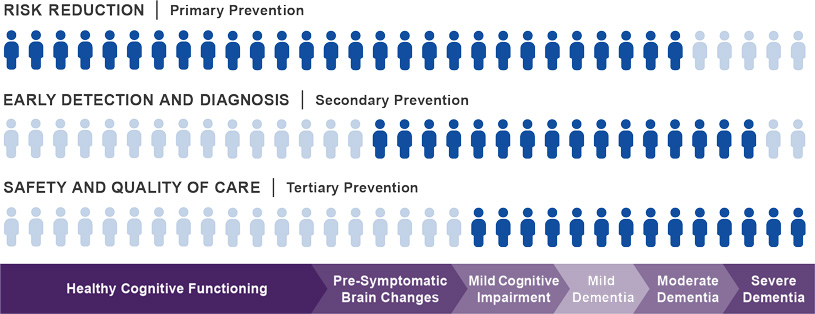Public Health Approach to Alzheimer’s
Increasingly, communities around the country are taking a public health approach to address Alzheimer's, a pivotal and growing public health crisis that requires robust responses.
Alzheimer's is a public health issue
Alzheimer's and other dementias have become a public health issue because:
- The prevalence and costs are substantial.
- The impacts are serious.
- There are public health solutions.
Prevalence and Costs: Today, more than 7 million Americans are living with Alzheimer's, and in 2024, the cost of caring for them was $384 billion. Ten percent of adults aged 45 and older report subjective cognitive decline, one of the earliest warning signs of Alzheimer’s disease. Prevalence is only projected to grow. By 2050, nearly 13 million Americans could be living with Alzheimer's, with costs reaching nearly $1 trillion.
Impacts: More than 95% of people living with Alzheimer's and other dementias have at least one other chronic condition, such as heart disease, diabetes, or stroke. Alzheimer's complicates the management of these chronic conditions, resulting in poorer health outcomes and increased health care costs.
Nearly 12 million caregivers provide over 19 billion hours of care. Federal and state governments shoulder two-thirds of the health and long-term care costs of those living with Alzheimer's through Medicaid and Medicare.
Public Health Solutions: There are public health tools and strategies that can improve health outcomes for people affected by dementia in every community. A strong public health response implements population-based solutions that include:
- Promoting brain health.
- Increasing access to early detection and diagnosis.
- Supporting people living with dementia and their caregivers.
For more than a century, public health action has led to people living longer, healthier lives. But as the size of the population aged 65 and older continues to grow, we are faced with new public health challenges, including the growing prevalence and mortality of Alzheimer’s and dementia. It is imperative that public health addresses Alzheimer’s and dementia from a population health perspective.
View the Alzheimer's: A Public Health Issue infographic (PDF).
How does public health address Alzheimer's?
Public health works to improve the health and well-being for the whole community — at any stage of life, at any age. Even though most people with Alzheimer's are over the age of 65, the brain changes associated with Alzheimer's begin to develop many years, even decades, before symptoms appear. Behaviors and health conditions even earlier can affect a person's risk for later-life dementia. That is why a life course approach to Alzheimer's and other dementias is needed and why public health must work across the life course.

This illustration identifies opportunities for public health intervention across the dementia life course. The public health community can intervene across the points of prevention — primary, secondary and tertiary — to impact the health of the population. The figure shows the potential impact of the different prevention points throughout the continuum of dementia.
- Risk Reduction (primary prevention) can have the biggest impact across a population. Much can be done to reduce risk of cognitive decline and possible dementia. Examples include lowering blood pressure, eating healthy and doing physical activity. Learn more about public health and dementia risk reduction.
- Early Detection and Diagnosis (secondary prevention) can improve access to and knowledge of diagnostic services and supports, and the early warning signs of dementia. Public health action on early detection can include work that changes the culture around talking about memory and thinking problems, both among the public and among health care providers. Diagnosis is important and can help enable access to care planning, financial and legal planning, support programs, and clinical trials. And, as more treatments become available, early detection and diagnosis become essential. See ideas for specific public health action.
- Safety and Quality of Care (tertiary prevention) can help support people living with dementia and their caregivers. Public health action can help ensure access to and knowledge of supports and services, improve community-clinical linkages, and strengthen training of care providers. Learn more about public health's role.
Employing these opportunities, public health can intervene to lessen the burden of Alzheimer's, just as public health has helped reduce the burden of heart disease, HIV/AIDS and cancer.
